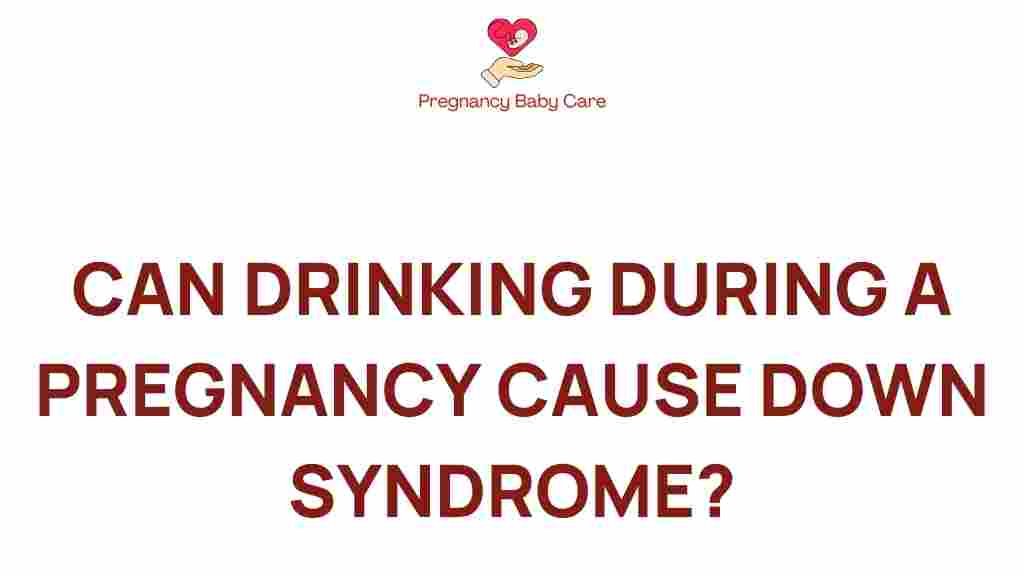Unraveling the Myths: Can Alcohol Consumption During Pregnancy Lead to Down Syndrome?
Pregnancy is a time filled with joy and anticipation, but it can also be a phase laden with questions and concerns regarding maternal health. One of the most significant discussions surrounding pregnancy is the impact of alcohol consumption on fetal development. This article aims to unravel the myths associated with alcohol consumption during pregnancy, particularly focusing on whether it can lead to Down syndrome. Understanding the actual risks involved is crucial for expectant mothers and their families.
The Link Between Alcohol and Fetal Development
Alcohol is a teratogen, which means it can cause developmental issues in a fetus when consumed during pregnancy. The most researched condition related to alcohol consumption is Fetal Alcohol Spectrum Disorders (FASD), which can lead to various physical, behavioral, and learning problems. However, the specific link between alcohol and Down syndrome is less clear.
Understanding Down Syndrome
Down syndrome, also known as Trisomy 21, is a genetic disorder caused by the presence of an extra chromosome 21. It is characterized by developmental delays, specific facial features, and potential health issues. The exact causes of Down syndrome are not fully understood, but it is primarily associated with maternal age and genetic factors rather than environmental influences like alcohol consumption.
Myths vs. Facts About Alcohol and Down Syndrome
There are several myths regarding the effects of alcohol on pregnancy and the risk of Down syndrome. Let’s examine some of these myths and the factual information behind them:
- Myth: Consuming alcohol during pregnancy will definitely cause Down syndrome.
- Fact: There is no substantial evidence to support that alcohol consumption directly causes Down syndrome. The primary factors are genetic and maternal age.
- Myth: Light drinking is safe during pregnancy and does not affect fetal development.
- Fact: There is no known safe amount of alcohol during pregnancy. It’s best to abstain completely to avoid risks of FASD and other complications.
- Myth: Only heavy drinkers are at risk of having a baby with developmental problems.
- Fact: Even moderate drinking can pose risks, and the effects can vary from one pregnancy to another.
Risks of Alcohol Consumption During Pregnancy
While the direct correlation between alcohol and Down syndrome is weak, alcohol consumption during pregnancy poses significant risks to fetal development. Some of these risks include:
- Fetal Alcohol Syndrome (FAS): This is the most severe form of FASD, leading to various physical and cognitive disabilities.
- Developmental Delays: Children exposed to alcohol in utero may experience delays in physical and mental development.
- Behavioral Issues: Children may face challenges such as attention deficits and social interaction problems.
- Physical Abnormalities: These can include facial deformities, growth deficiencies, and organ malformations.
Importance of Maternal Health and Prenatal Care
Maintaining maternal health during pregnancy is crucial for the well-being of both the mother and the baby. Regular prenatal care can help monitor the health of the mother and the fetus, providing guidance on nutrition, lifestyle, and potential risks. Key aspects of prenatal care include:
- Regular Check-ups: Visiting a healthcare provider regularly can help detect any issues early on.
- Nutritional Guidance: A balanced diet rich in vitamins and minerals supports fetal development.
- Education: Expecting mothers should be educated about the risks of alcohol and other substances.
- Emotional Support: Pregnancy can be a stressful time; emotional support is vital for overall health.
Health Guidelines Regarding Alcohol During Pregnancy
Health guidelines from various organizations, including the Centers for Disease Control and Prevention (CDC), recommend complete abstinence from alcohol during pregnancy. Here are some important guidelines to consider:
- Zero Alcohol Consumption: No amount of alcohol is considered safe during pregnancy.
- Consult Your Doctor: If you have consumed alcohol before knowing you were pregnant, speak to your healthcare provider for advice.
- Awareness of Symptoms: Be vigilant about any signs of developmental issues in your child and seek prompt medical advice if needed.
Step-by-Step Process for Expectant Mothers
For expectant mothers, understanding how to ensure the healthiest pregnancy possible is vital. Here’s a step-by-step process:
- Stop Alcohol Consumption: If you are pregnant or planning to become pregnant, eliminate alcohol from your diet.
- Seek Prenatal Care: Schedule regular check-ups with a healthcare provider.
- Follow Health Guidelines: Adhere to the recommendations provided by your healthcare professional regarding diet, exercise, and substance use.
- Educate Yourself: Learn about the effects of various substances and the importance of maintaining a healthy lifestyle during pregnancy.
- Join Support Groups: Connecting with other expectant mothers can provide emotional and informational support.
Troubleshooting Tips for Expectant Mothers
If you find yourself struggling with the decision to consume alcohol during pregnancy or facing societal pressures, consider these troubleshooting tips:
- Communicate: Talk openly with your partner and family about your choices and concerns regarding alcohol.
- Seek Professional Help: If you have a history of alcohol use, reach out to a healthcare provider for assistance.
- Find Alternatives: Explore non-alcoholic beverages that can provide a similar social experience without the risks.
- Stay Informed: Read up on the latest research and guidelines regarding alcohol consumption and pregnancy.
Conclusion
In conclusion, while alcohol consumption during pregnancy is a topic of great concern, the myths surrounding its direct link to Down syndrome are largely unfounded. The primary risk factors for Down syndrome are genetic and related to maternal age. However, the consumption of alcohol poses significant risks to fetal development and can lead to various adverse outcomes. It is crucial for expectant mothers to prioritize their health and the health of their developing baby by abstaining from alcohol during pregnancy.
For more information on maternal health guidelines, you can click here. To read more about the implications of alcohol consumption during pregnancy, visit this external resource.
By staying informed and adhering to prenatal care recommendations, expectant mothers can contribute to healthier outcomes for their children.
This article is in the category Pregnancy and created by PregnancyBabyCare Team
